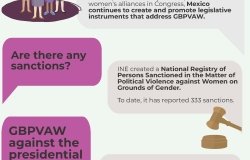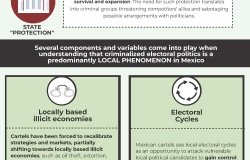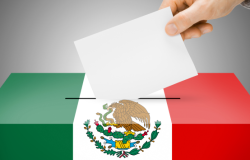Tunisia’s Islamist-Led Democracy Founders
Tunisia’s ruling Islamic party, Ennahda, has made repeated compromises on religious issues to meet secularist demands for a new constitution, according to Woodrow Wilson Senior Scholar David Ottaway. But Ennahda’s moderate leadership has lost secularist trust by showing too much deference to its own militant Islamic wing and fundamentalist Salafis outside the movement.
Tunisia’s ruling Islamic party, Ennahda, has made repeated compromises on religious issues to meet secularist demands for a new constitution, according to Woodrow Wilson Senior Scholar David Ottaway. But Ennahda’s moderate leadership has lost secularist trust by showing too much deference to its own militant Islamic wing and fundamentalist Salafis outside the movement. The following paper was published as Viewpoints No. 43 by the Middle East Program.
Tunisia's moderate Islamists have failed to convince skeptical secularists that they are committed to separating religion and state as the basis for a new multi-party democracy here. As a result, it remains far from clear that what has been widely regarded as “the most likely to succeed” example of Islamic rule to emerge from the 2011 Arab Spring uprisings is on course for success.
The Ennahda movement leading Tunisia's shaky coalition government gave in to secularist pressure on September 28 and agreed to resign to make way for a government of technocrats in charge of overseeing new parliamentary and presidential elections. It is still insisting, however, that the National Constituent Assembly must first complete the draft of a new constitution and set a date for the elections.
This political retreat underlined Ennahda's inability after two years in power to gain the confidence of Tunisian secular parties and civil society groups that it is truly dedicated to building a "civil state"—a code word for keeping religion out of politics, or at least out of government. A recent poll by Zogby Research Services found that Ennahda retained the confidence of only 28 percent of Tunisians today and that outside of its own supporters 95 percent are against its rule.
Ennahda's commitment to a civil state dates back to 2005 when together with secular opposition parties in the "18 October Collective," it drafted a reform program declaring “a civil state built on republican doctrines and human rights” the only acceptable basis for a new Tunisia. The movement’s leader, Rachid Ghannouchi, continues to reaffirm this commitment despite huge doubts among secularists that he really is.
The Muslim Brotherhood in Egypt also pledged allegiance to the civil state concept and also failed to win the confidence of secularists. So they launched a campaign last spring to drive the Brethren out of government, turning for support to the powerful Egyptian army to achieve their goal. On July 3, the army ousted President Mohammed Morsi, the first democratically elected Islamist leader in the Arab world's contemporary history.
In Tunisia, the army is small and remained apolitical since President Zine el-Abidine Ben Ali fled the country in early January 2011. Instead, the powerful labor confederation known as the General Union of Tunisian Workers (UGTT) has taken the lead in forcing Islamists to step down.
The left-leaning UGTT constitutes the major force behind an alliance of secular civil society groups that includes the main association of private businesses, UTICA (Tunisian Union of Industry, Commerce, and Artisanal Workers), as well as that of human rights activists and lawyers. This so-called “Quartet” has been trying to mediate a way out of the current political impasse in talks with Ennahda, which have now been expanded to include 26 parties and all government leaders. This new “national dialogue” that began on October 5 has ground to a halt, creating a sense of acute national crisis.
Both the Muslim Brotherhood in Egypt and Ennahda in Tunisia had held lengthy internal debates—the latter also with leftist secular and human rights groups—before coming to power in 2011 on the notion of the civil state as a basis for democratic governance.
Once in power, however, both groups often allowed their hardliners to set the religious agenda and strove to gain control of the state apparatus in order to assure their continued election success against opponents. In doing so, they tended to confirm secularist suspicions that Islamists had no intention of ever leaving once installed in power.
In Tunisia, Ennahda's struggle to convince secularists of its bona fides was complicated from the start by Ennahda’s failure to set up a political party separate from its religious organization after the downfall of former President Zine al-Abidine Ben Ali in January 2011. This left an avowedly Islamic movement competing against militantly secular parties in the elections for a National Constituent Assembly in October 2011.
Ennahda won the elections, though only with a plurality of 37 percent of the vote. This forced it to find other partners and share power with two secular parties in what became known as “the Troika” government. This power-sharing arrangement initially raised hopes that a civil state would indeed emerge.
Instead, unending squabbles over a new constitution inside the Constituent Assembly dashed these expectations as hardliners among Ennahda’s 89 delegates (out of a total of 217) pressed their religious agenda. Though mandated to finish the constitution by October 23, 2012, the assembly still has not resolved 10 outstanding issues almost two years after the assembly was elected.
Ennahda has come under attack from secularists partly because its decision-making is dominated by a religious figure, Rachid Ghannouchi, who remains outside both the government and the Constituent Assembly. Ghannouchi has nonetheless repeatedly proven himself to be a pragmatist willing to compromise with secularists on religious issues. In the process, he has repeatedly overruled Ennahda’s hardliners even while losing secularist support. The Zogby poll found only 27 percent of Tunisians overall considered Ghannouchi “credible” as a leader and only three percent among those declaring no confidence in Ennahda.
Secularists blame Ghannouchi for coddling Ennahda’s most militant Islamists far too long as well as extremist Salafis who attacked Western-style art exhibits, anti-Islamist movies, bars serving alcohol, and secularist gatherings with impunity. Ghannouchi also defended the militant Leagues for the Protection of the Revolution, which has been involved in assaults on secularist meetings and rallies.
Only after Salafi extremists attacked the U.S. embassy and American school in Tunis in September 2012 did Ghannouchi’s attitude toward the Salafis begin to harden.
Then came the assassinations of two popular leftist leaders, Chokri Belaid on February 6 and Mohamed Brahmi on July 25, both of this year. The latter led to the walkout of 60 delegates in the Constituent Assembly and brought the Islamist-secularist confrontation to a head. The Interior Ministry blamed the two killings on extremists belonging to the al-Qaeda-linked Ansar al-Sharia. It has also discovered secret Ansar cells spread across the country as the army engaged in bloody clashes with its activists in the mountains along the Algerian border.
Despite this upsurge in Ansar-provoked violence, the government waited until late August to officially declare it a terrorist group and launch a full-scale crackdown on its activities. By then, however, many secularists had come to the conclusion that Salafi extremists were acting like a secret militia of Ennahda.
Ghannouchi himself initially preached tolerance toward violence-prone Salafis, arguing they should be viewed as wayward "children” who did “not understand Islam” and needed only to be re-educated. Now, he is quick to declare the government “in a state of war” with these Salafis even while insisting they constituted only a small minority of Salafis, no more than 300 to 400 “terrorists.”
The long, drawn-out debate over Islamic provisions in the new constitution proved another indicator of Ennahda’s lack of commitment to a civil state in the eyes of Tunisian secularists. Ghannouchi had to intervene personally to force Ennahda’s most conservative deputies to drop their campaign to make Islamic religious shari’a law the basis for legislation. These deputies nonetheless succeeded in inserting Article 141 in the draft of the constitution that declared Islam to be the religion of the Tunisian state.
That article would appear to stand in direct contradiction to the key principle underlying the civil state. Only in late July did Ennahda finally agree to drop the article during talks with secularist assembly deputies to resolve the outstanding 10 points at contention in the constitution. Brahmi’s assassination on July 25 put an end to their discussions until the new enlarged national dialogue got underway on October 5.
Tunisian secularists also came to doubt Ennahda’s commitment to the separation of religion and state after it began using its dominant position in the Troika government to replace 18 of the country’s 24 regional governors and place several thousand of its own appointees in key local and regional government positions. They saw this as a nefarious attempt by Ennahda to gain control of the state apparatus to assure another victory in forthcoming elections.
Ennahda officials assert there is nothing wrong, or unusual, in the party that won elections appointing senior government officials. They point to the same practice by Democratic and Republican parties in the United States. “Ennahda members were excluded from government for the last 22 years,” said Ghannouchi in an interview. “They want us to stay outside the administration.” Only two of the 18 new governors were Ennahda members, he said, offering to set up a committee to examine the qualifications of all new appointees.
The Ennahda leader insisted his organization was still committed to the separation of religion and state, asserting there was “no reason to fear Islamists are in power to impose a style of life” on Tunisians. “The state’s concern is security and social services, not lifestyle.” Ghannouchi pointed to Ennahda’s decision in the late July constitutional talks to drop article 141 making Islam the state’s religion as proof of its continuing commitment to the civil state.
Related Program

The Islamists
Learn more about Hamas and how it relates to similarly aligned organizations throughout the region. Read more









